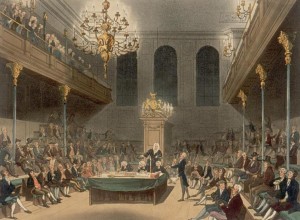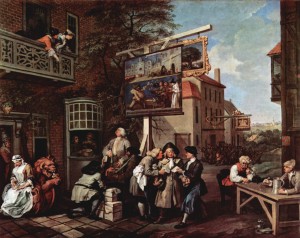I’ve always found the process of democracy—and elections in particular—rather fascinating. And as we head into the month of November here at Regency Reflections, we’re going to talk a bit about government.
In Regency England, I’m afraid voting options were rather limited. Britain’s Parliament is (and was) divided into two houses, the House of Lords and the House of Commons. The House of Lords was composed of peers who were approved membership by their fellow peers, and these positions in the House of Lords were handed down through heredity. Your regular English coal miner or weaver or farmer had no voice in anything that happened in the House of Lords.
The House of Commons was a little more democratic in nature. These members were “elected,” by counties and boroughs, though a lot of corruption was embedded in the electoral process. When Regency characters in novels and movies mention purchasing a seat in the House of Commons, that’s because the electoral process was so crooked individuals could well “purchase” seats that were supposed to be “elected.”
Further complicating the issue, a Member of Parliament representing a county had to have a yearly income of 600 pounds. And a Member of Parliament representing a borough had to have a yearly income of 300 pounds. Thus election to and involvement in parliament was unattainable for the average Englishman. In fact, lower born sons of peers filled a good number of the seats in Commons for this very reason.
Even more disparaging, all voting was done open ballot, and oftentimes retribution could occur if you voted for the wrong person. For example, if an earl’s third son was running for a seat in Commons and you farmed the earl’s land, you could go cast your vote for the opposing candidate. But you might well loose your rights to farm as a result.
Elections were hardly honest or fair. It was a world where the most elite and wealthy controlled the government and gave the bulk of the country’s citizens very little power. Most citizens were not even allowed to “vote.”
To vote in county elections, a person had to be:
1). Male
Though offensive to most people living today (myself included), this was completely normal for the time period. Women’s suffrage wasn’t even thought of yet.
2). A Property Holder with land worth 40 shillings or more per year
This is known as the forty shilling freehold.
To vote in borough elections, you had to be:
1). Male
2). A resident of the “right” county or borough.
There were a lot of populated cities in Regency England that didn’t get any representatives in the House of Commons. The designated “boroughs” were delineated during the Middle Ages and not changed until 1832. So numerous cities that sprang into existence due to industrialism were denied members to the House of Commons, while some extremely small communities that had been thriving 400 years earlier got to elect officials.
3). Owner of a certain amount of wealth or property.
The degree of wealth and property ownership varied from borough to borough. In some places, the forty shilling freehold stood. In others, not receiving alms or poor relief earned you the right to vote. And in others, simply owning a home gave you opportunity to vote.
So now I’m curious. If you’d been living during the Regency days, do you think you (or your husband) would have been able to vote? I daresay my husband would not own enough property to qualify.
Originally posted 2012-11-05 05:00:34.


Comments are closed.